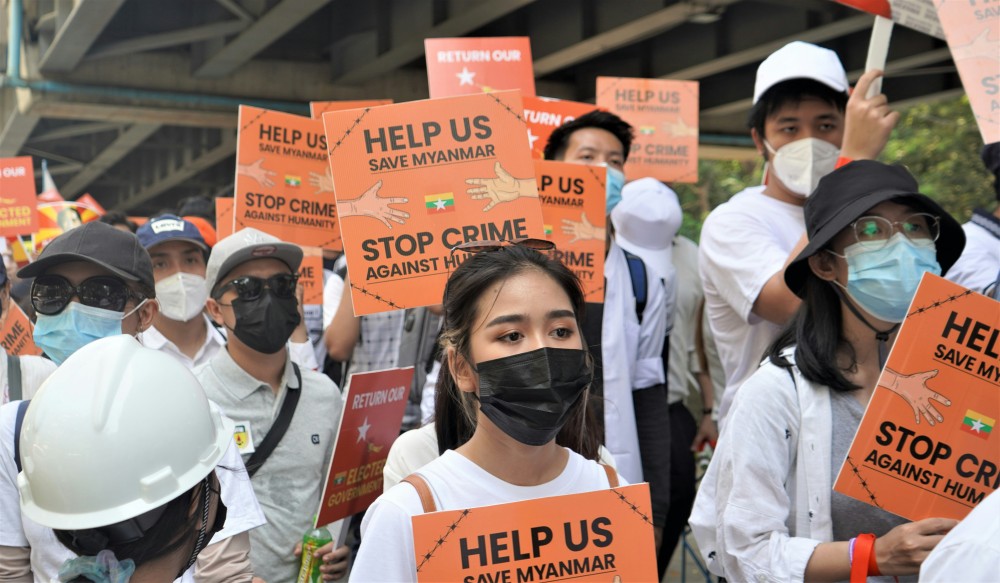Murder of Baptist pastor in Myanmar brings new attention to ‘under-reported’ war

Actress Phone Thiri Kyaw joins a 2021 protest in Yangon, Myanmar. (Unpslash photo by Saw Wunna)
The fatal shooting of a Baptist pastor in Myanmar reflects an upsurge of civil war violence targeting Christians, Muslims, and other religious and ethnic minorities.
Outrage over the March 18 killing of Nammye Hkun Jaw Li comes at a time of rising global diplomatic and economic pressure on the Tatmadaw military junta to cease its oppression of Baptist Christians, Rohingya Muslims, and other groups.
As of February, the United Nations estimated at least 50,000 people had died since the military’s 2021 coup sparked civil war in Myanmar, which the United States and many others continue to call by its historic name, Burma. The conflict has internally displaced more than 2.7 million and forced about 59,000 to seek safety in neighboring countries.
Now in its third year, the “under-reported war” has seen sharp increases in the use of explosive weapons, resulting in skyrocketing casualties among military forces, armed ethnic groups, and civilians, the UN reported.
“Consequently, the conflict resulted in 2,164 reported civilian casualties from explosive weapons in 2023, including 745 fatalities, reflecting a 121% and 155% increase in casualties and deaths, respectively, over 2022,” the UN said. “The military is linked to 85% of these civilian casualties and 88% of the fatalities.”
But Li’s shooting death has rattled the majority Baptist population in Kachin state, Radio Free Asia reported.
According to witnesses, three unidentified men shot the 47-year-old pastor multiple times as he worked in his computer store. He leaves behind a wife and three children.
Witnesses described the incident as an assassination and the shooters as hitmen. Li was a popular community leader and former official with the Kachin Baptist Convention actively involved in anti-military protests and anti-drug trafficking efforts.
The Radio Free Asia report added that religiously motivated violence in Kachin state has led more than 10,000 residents to flee as battles rage across the region.
“The area has also seen a resurgence in fighting as rebels take territory from the junta military,” the report said. “The Kachin Independence Army has seized a major road and 14 junta camps in addition to shutting down a regional airport with missile attacks in Kachin state. Junta troops have retaliated with indiscriminate attacks on civilians, torching homes and dropping bombs on villages in February.”
The violence in Kachin state parallels fighting nationwide. The Associated Press reported the government has stepped up attacks against civilians in response to battlefield setbacks at the hands of armed ethnic and pro-democracy groups.
Meanwhile, global efforts are under way to boost the flow of humanitarian aid to the region and to apply greater diplomatic pressure on Burma’s military government.
“Across Myanmar, 18.6 million people are in need of humanitarian assistance in 2024, with people struggling to survive amid conflict and insecurity, civilian safety and protection threats, as well as soaring inflation that is affecting people’s ability to meet basic needs,” the UN said.
In response, the UN seeks to raise $994 million this year to provide urgent assistance to victims of the war. Separately, the European Union has pledged more than $20 million in aid while the US announced late last year its plan to provide at least $116 million in continuing emergency aid.
The US Commission on International Religious Freedom has urged the State Department and Congress to do more, especially to help end the officially designated genocide against Rohingya Muslims.
“The very military that perpetrated genocide against the Rohingya is now attempting to draft them into service, even without a path forward for citizenship after serving,” USCIRF Commissioner Eric Ueland said.
“The Tatmadaw is running the country unchecked and chaotically. As outlined in the BURMA Act of 2022, the US government must encourage the National Unity Government to incorporate accountability mechanisms for atrocities committed by the Burmese military against Rohingya.”
According to USCIRF’s 2023 report on Burma, Muslims comprise 4.3 percent of Myanmar’s population, compared to Christians (6.2 percent), Animists (0.8 percent), and Hindus (0.5 percent). Most of the population, nearly 88 percent, is Buddhist.
Since the coup, the military has destroyed mosques, churches, and the temples of Buddhist groups not aligned with the Tatmadaw. Anyone considered to have insulted Buddhism orally, in writing, or online can be imprisoned up to two years under the nation’s blasphemy law.
USCIRF has recommended the State Department redesignate Burma as a Country of Particular Concern for its ongoing and systematic violations of religious freedom. “Government forces have also burned villages of religious minorities and even members of the Buddhist majority, destroying homes and houses of worship and schools in the process,” the watchdog agency said.
The commission also has called for increased international assistance for nations sheltering about 980,000 Rohingya Muslims, while 21Wilberforce last year urged Congressional action to protect 1.3 million ethnic Baptists who have fled Burma and another 1.9 million who are hiding in jungle areas.
The Christian human rights organization added that Burma is an original mission field for US Baptists and that Baptists comprise nearly 90 percent of the Kachin and Chin states, in addition to large numbers among the Karen and other ethnic groups. —Baptist News Global


